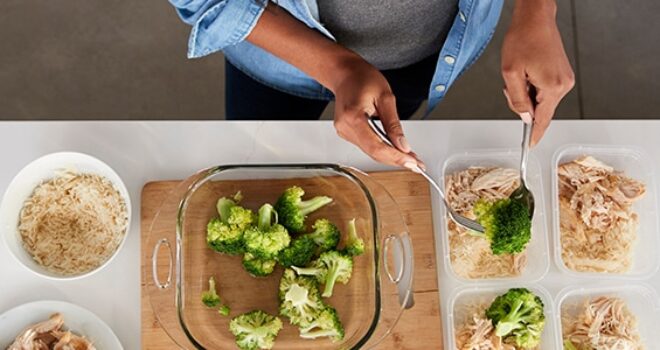Meal prep has become a popular trend in recent years. More than an awesome time saver, it’s also a way to eat healthier and save money! And the icing on the cake… it also helps to reduce your impact on the environment. Read all about it.
Nowadays, meal prep has become a habit in many households. Bulk cooking at the weekends saves loads of time during the week. Not a fan of cooking for an entire day? No worries! There are other ways to meal prep:
- Batch-cook a recipe and eat leftovers the following week
- Prepare a litre of sauce and have it on hand for several days
- Bulk cook vegetables and store them in the freezer
- Mix-and-match with fridge and freezer leftovers
Why do meal prep? What are the advantages?
The main advantage, as we mentioned earlier, and the reason many people have adopted this technique, is saving time. You can cook potatoes once and eat them for several days. But maybe you don’t want to eat the same thing every day. By mixing and matching, however, you can vary flavours, textures and food combinations. A study even showed that meal planning is associated with a more varied diet.
Thanks to meal prep, homemade meals are a daily possibility. No more excuses! This means more balanced and healthier meals. Dishes made at home generally contain less fat, calories, sugar and salt, and more vegetables. You are the cook: you decide what to add to your recipes. Meal prep also ensures better portion control.
Contrary to what you might think, it’s not a costly procedure. Among the many tricks to save money, meal prep is one of them. Buying in bulk is cheaper; you throw away less food (less money wasted); and you can avoid eating out since there is always food at home. The usual tips to save money and eat healthy still apply: eat seasonal, buy only what you need, compare prices.
Eating seasonally, planning meals, preventing food waste, cooking efficiently… do these ring a bell? They’re all good for the planet! Brilliant, isn’t it?
TIP: Prepare in bulk ingredients that your usually shy away from when you’re not in the mood or don’t have the energy to cook. Vegetables? Pulses? You can also buy them frozen; they are often easier to prepare.
Meal prep: how to get started
Start out slow. Double a recipe; cook vegetables and store them in the freezer in an organised manner: ingredient name, preparation method, quantity, preparation date. Do you prefer cooking your protein just before eating rather than preparing it in advance? No problem: marinade your tofu, tempeh or poultry, and soak legumes beforehand. It’s a real time saver and ensures tasty dishes! Just cook in a preheated oven or a skillet.
How long can food be stored in a freezer?
To minimise nutrient loss, ensure food safety and lock in flavour, be mindful of storage times:
In fridge at 4°C:
- 1-2 days: cooked minced chicken or beef
- 3-4 days: cooked poultry and fish, soups and stews
- 5 days: cooked beans and hummus
- 1 week: hard-boiled eggs, chopped vegetables in an airtight container
- 2 weeks: soft cheese, once opened
- 5-6 weeks: hard cheese, once opened
In freezer at -18°C:
- 2-3 months: soups and stews, cooked beans
- 3-6 months: cooked meat or chicken
- 6-8 months: chopped berries and fruit (bananas, apples, pears, mangos) in a freezer bag
- 8-12 months: vegetables blanched for 3-5 minutes (depending on the vegetable)



 Chard
Chard  Eggplant
Eggplant  Vegetable garden: growing red beans
Vegetable garden: growing red beans 









